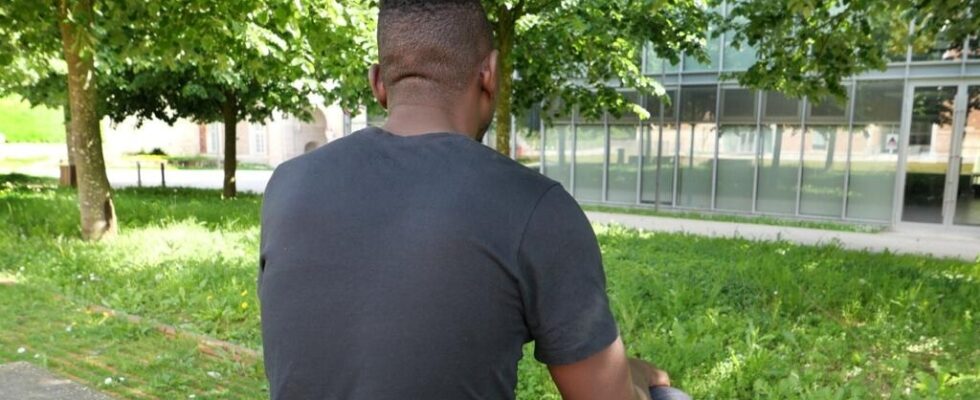To save his life, Traoré had to leave his country, in disaster, overnight, in 2018. Exiled in the north of France, he no longer lives in hiding and found a family in an association that fights against discrimination. to LGBTQIA+ people.
5 mins
One afternoon in July 2023, in the streets of Amiens, Traoré sang, danced, shouted, for several hours, surrounded by a crowd of 3,000 people. It was his first Pride march. “ I was proud to be gay, I never imagined I would do that one day, it was incredible. » Since he pushed open the door of the association Flash Our True Colorswhich fights against discrimination against people LGBTQIA+the 34-year-old Malian found “ a real family “, caring and attentive.
“ I can finally be myself, I’m no longer hiding “. This is the new Traoré, he says with a burst of laughter, “ with a desire to live, and joy “. The other Traoré, the withdrawn, the secret, is “ dead “. He has so often silenced his story that today he feels the need to tell it. It’s still painful, the words sometimes struggle to come out, but breaking this silence makes him “ good “, “ I am learning to testify to denounce “. In his country, the Malibeing homosexual is often seen as “ unnatural, because of the weight of religion “.
Born in Segou, Traoré, with his little sister and his mother, lived to the rhythm of the work of his father, an agricultural worker. A childhood moving from farm to farm, all over the country, to survive. “ I didn’t go to school, but I took some evening classes to learn to read and write “. He has known for a long time that he is attracted to boys, ” the others had girlfriends, I preferred to stay alone and people pointed it out to me “. At 15, he started flirting with a boy and discovered love. “ I already knew that we had to hide, otherwise the family would beat us “.
Nightmare
In 2010, his father found work in Ivory Coast. He is 20 years old and begins to learn the profession of driver in a company that buys and resells cocoa and coffee. But the country is in the middle of a crisis, and in 2011, “ my father was murdered by rebels, we had to return to Mali “. For several months, he was “ sad and dejected. I lost my father and left my boyfriend at the time “. In Segou, with the help of a friend, he eventually got back on his feet and opened a small grocery store. He falls in love again. His partner, who lives in Bamako, joins him from time to time during the week. “ One day, while we were both at home, my mother needed me and sent a little boy to pick me up. “. The child surprises them in their privacy, and runs to warn the neighbors around. “ Five or six people came into my room, they started beating me “. On his forehead he shows a scar, “ she is still there and reminds me of that terrible moment “. He manages to escape when the neighbors start to beat his companion. “ I had no choice. I ran, and took a taxi to leave the city and take refuge in a nearby village “. In the evening, he calls his mother to ask for help. “ That’s the day she found out I was gay. She was angry and told me that she regretted giving birth to me, that I no longer existed for her “. While recounting this phone call, Traoré places his hand on his heart, his voice chokes. “ Even today, this moment is very, very difficult “.
Without knowing if his companion is alive or dead, he decides to leave Mali and go to France. “ I leave for Burkina, Niger, then Libya, where I have to stay for two years to work here and there and have enough money to pay the smugglers. » Crossing the Mediterranean is a nightmare. “ There were around fifty of us on the boat, which started to take on water. » The smell of gasoline, vomit, no water or food. “ The people next to me were so exhausted that they fell into the water and died. If I got through it, it was by miracle “.
After three days, Italian help arrived and Traoré set foot on European soil for the first time, in 2020. Then France, Paris and Amiens. “ The hassle of applying for asylum began because I had my fingerprints taken in Italy “. He is ” dublin “, he had to ask for asylum in the first European country he visited, and he was sent back to Italy several times. “ But I wanted to live in France, so I came back “. In Amiens, he stayed with a friend. It’s his lawyer who tells him about the association Flash Our True Color. “ I meet refugees like me there, especially Nigeriens and Congolese, I understand that I am not alone “. The association helps him in his efforts and a new fight begins for him: obtaining asylum. “ I was rejected several times, I went all the way to the national asylum court, where my request was rejected. They listened to me explain my story, that I was homosexual and that I was risking my life in my country, but they did not hear me. There’s no way I’m going back there “.
